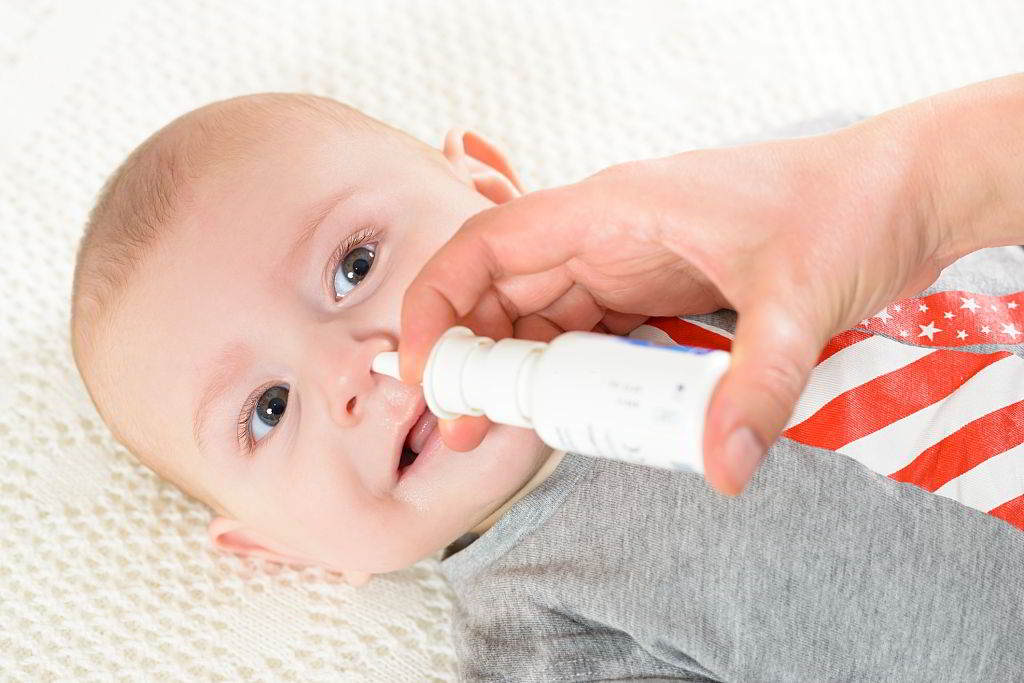Babies congestion at night is a popular childhood matter, resulting from the blood vessels and the swelling of the issues inside the nose. The National Library of Medicine points out that large numbers of cases of nasal congestion are caused by bacterial or viral infection and self-resolve within a week.
If your child’s congestion is accompanied by some other signs such as facial swelling, blurred vision, prolonged coughing episodes or serious throat pain, or your baby congestion lasts more than two weeks, go to see your child’s doctor for consulting.
Some typical symptoms of babies congestion at night
Nasal congestion causes more annoyance in newborn babies, because, in fact, they are in the early neonatal period to around 2 months of age or more. A few common symptoms which should be watched for are listed below.
- Crying or getting agitated
- Difficulty with feeding
- Nasal discharge
- Possibility of fever
- Difficult sleeping
- Snorting
- Snoring
- Coughing
- Sneezing
- Greater comfort when sitting upright
What you need to watch for
As regards your baby nasal congestion, there are two important things that you should be keeping track of:
#Symptoms Of Troubled Breathing
Firstly, if you want to recognize the common signs of troubled breathing, put your ear directly on your baby’s bare chest. Once you hear a sound that is rasping while he is breathing, then he has a wheezing. This points out that your child has got a cold, and it has gone into the baby’s lungs.
Antibiotics might be needed in order to eliminate them again. Even if it’s after hour, make a phone call with the doctor. He will suggest making a next-day appointment, or maybe he will ask you to take you baby to the Emergency Room. However, anyway, listen to his decision.
#Signs Of Dehydration
The second sign that may contribute to your baby congestion is dehydration. It is one of the most severe important reasons that cause most babies to be taken to the hospital. Mothers cannot feed their congested babies well, which make them get more chances of getting dehydrated.
You are required to boost the number of nursing sessions you have or bottles, maybe every 30-40 minutes if needed to make up for this. Unless you baby has got a wet diaper in 6-8 hours, contact your doctor. Perhaps, she will advise you to offer your baby some drops of Pedialyte, then you can get a few on hand.
It any of these symptoms happens, then your baby is in dehydration danger and is required to receive instant medical care.
- Cries without tears or has a dry mouth ( newborns have no tears yet)
- A sunken soft spot on the top of his head ( you can feel at ease in his first 6 months)
- A faint pulse which seems so fast.
- Cool skin with blotchy red patches
- A feeble whine-cry, instead of a strong wail
- Breathing so fast, like he is running a race
- Eyes that seems to be sunken into the skull
- What the doctor call “ listlessness”. In other words, he got no interest in feeding and playing, does not react to being held, or is not moving his legs or arms a lot.
Tips for Dealing with baby nasal congestion
If you know for sure that your infant actually gets a cold ( or maybe other congestive matters, it’s very necessary to do anything that can help alleviate the situation because the congestion can reduce the ability to swallow or suckle liquid.
Here are few useful tips for babies older than four months:
1. Keep infant’s head raised
Make sure that your baby’s head is raised at around 30-degree angle in order for the mucus to drain. You can fold a blanket and then place it at the head of the crib under the bed’s mattress (be certain that you adjust the angle of the mattress properly so that your child cannot roll down).
In order to put a curb on drainage and for acute symptoms, you can additionally place your baby in a car seat offering an angled position or keep him straight against your chest while seating or standing. These both methods can hold the infant’s head straight, which makes the mucus flow downward.
2. Try steam or warmth
A few pediatricians suggest a steamy bathroom or a warm bath in order to help put a curb on congestion:
All you need to do is turning on the shower and make the bathroom full of steam. After that, bring your baby to the steam room and allow him or her to enjoy breathing in a warm moisture environment. This can do a lot of good in relieving cough and chest congestion.
3. Keep the moist and your baby hydrated
Your child requires a great amount of fluid, particularly when they become ill. Remember not to force him or her to eat, just keep feeding normally. In case your baby loses her appetite or cannot eat at all, call her doctor, just to ensure her safety.
A humidifier should be included in your child’s room as it provides the moisture that helps your baby to breath better. (Despite that fact, be sure to keep the humidifier clean to prevent any moldy heath risk)
You should stay with your baby with the hot water running in the warm bathroom. And the closed may also help relieve the congestion. Make the room teeming with the steam and try to stay with your newborn for a couple of minutes, be certain that he does not get too hot. If you see his cheeks begin to turn red or he expresses uncomfortable feeling, take him to a cooler room.
Don’t forget to alter the daily water to make sure that mold cannot get any chance of developing in the tub.
4. Wipe the nose with a warm and soft cloth.
A wet and warm cloth ( not a sopping-wet one but a squeezed-out washcloth) should be used to gently clean around the infant’s baby. After that, allow him or her to sometimes breathe a handful of warmth from the cloth for a while.
How to deal with nasal congestion in newborns at night
1. Make a phone call to the pediatrician
If your baby has a runny nose, is having trouble breathing or has a raspy or rattling sound from her chest, call the doctor.
2. Clear congestion
Your newborn baby may find it hard to suck with the obstacle of the congested nose. It is, therefore, very important to keep his nasal passages clean. If you can get his pediatrician approval, then you can use a mild nasal saline spray, available at most baby supply or drug stores
Conclusion
There are few things worse than listening to your baby boy struggle to breathe. And you feel so bad for the baby because they don’t know how to sniff or blow their nose yet. Therefore if you really want to stop babies congestion at night with the hope of helping your baby to get through the nasal stuffiness, try hard to take full advantage of the solutions above.



